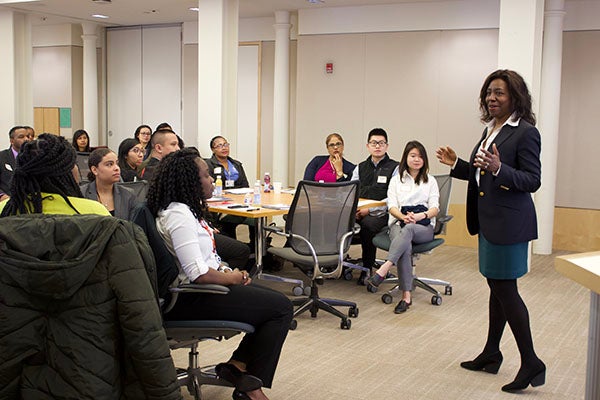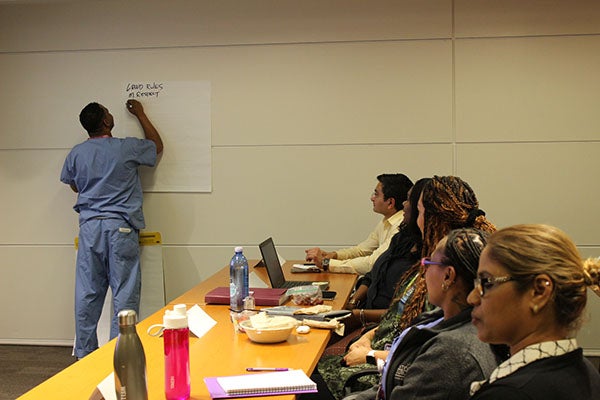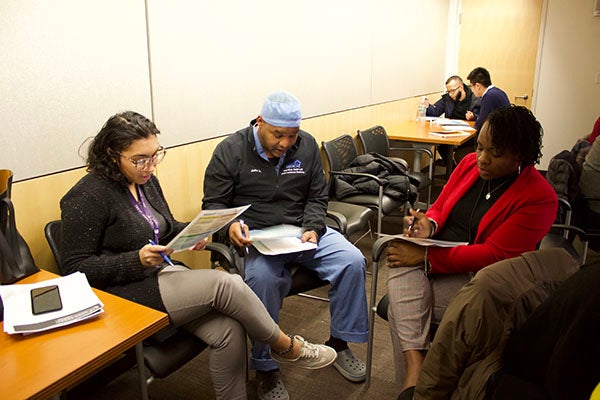Innovation in medicine often brings to mind advanced surgical robotics or the latest breakthrough pharmaceutical drug. But innovation behind the scenes can be every bit as impactful. Such is the case for Pathways: A Leadership Acceleration Program, a recently developed initiative aimed at increasing inclusion and diversity at the leadership level across Boston Medical Center Health System. The program’s goal is simple but transformative: to help fast-track career advancement for high-potential employees of color within the institution.
“Looking at the diversity and inclusion data that we have at Boston Medical Center, it shows that we are diverse when it comes to our staff, and we’re looking to further the diversity among our leadership levels,” explains Amy Thai, MEd, senior manager of Organization Development and Effectiveness at BMC, who serves as the lead facilitator of the program. “Pathways pinpoints many of our top-performing team members and prepares them as they take that first step toward management level. Pathways is part of our diversity and inclusion strategy and aims to holistically cultivate the next generation of leaders of color, resulting in sustainable change and impact.”
The program offers participants an intensive six-month leadership and management curriculum focused on topics such as improving leadership communication, leading across differences, and resiliency. Pathways provides wraparound career development support, engaging the employee’s current manager, providing a career coach, mentors, and a career navigator to help identify job opportunities within the health system. All mentors and speakers are BMC employees who volunteer their time to the program. Since its origin in 2019, there have been two cohorts so far and 16 promotions among them.
Leadership training benefits employees and patients
Pathways graduate Joel Fuertes is one of the 16 recently promoted. Fuertes, who came to BMC six years ago, believes Pathways was integral to helping advance his career to operations supervisor in the Department of Neurology.

“I didn’t have the formal credentials of mastering in healthcare administration which hindered my career advancement. Not being able to check off all the requirements in available openings stopped me from even applying. I can say that my track to become an operations supervisor has been different from the traditional hiring process,” explains Fuertes, who began at BMC as an ambulatory service representative. “Pathways was a great opportunity for me to hone my leadership brand following my promotion.”
Andrea Nicholson’s 30-year career at BMC began in the transport department, but she soon followed her passion for caregiving first in phlebotomy and then nursing. After attaining a master’s degree in leadership from Curry College, Nicholson was offered a position as a nurse manager for BMC’s 7-East inpatient unit. Still, when she accepted the position in October 2019, she knew there was much more to learn about management. Pathways provided the additional support she sought.
“Pathways was a place of support and provided a space for people of color to discuss the challenges they were facing in the hospital. The curriculum introduced concepts I didn’t learn in graduate school, such as ‘The Platinum Rule,’ cultural competence, and emotional intelligence. Pathways taught me how to lead across differences,” she says.
The potential of health equity by supporting career mobility
As she embraces her new management role, Nicholson looks forward to being a role model for other people of color in the hospital who are seeking leadership positions.

Both Nicholson and Fuertes credit their managers’ support in identifying their potential and nominating them to Pathways, illustrating how the program improves the dynamic between managers and their teams and prioritizes career mobility within the health system. It’s a culture shift that also greatly benefits the institution by mobilizing current employees familiar with BMC systems who can carry their institutional knowledge to better problem solve and advance ideas at the manager level.
“We know we already have the talent and, instead of using the time and resources to fill positions elsewhere, we’re working to tap into the wealth of talent we have here. We can spend our recruitment efforts internally and make sure our people can grow and feel supported for that next role,” explains Thai.

Thai says she is already sharing best practices of the program with other hospital systems seeking to replicate similar approaches. She believes the program is an integral investment. Career mobility can positively influence economic stability, which has broader implications in social determinates of health and health equity.
“Our employees play a key role in our health equity ecosystem,” she says. “We can maximize our efforts and our impact as a whole if we accelerate the focus on ourselves as well.”



